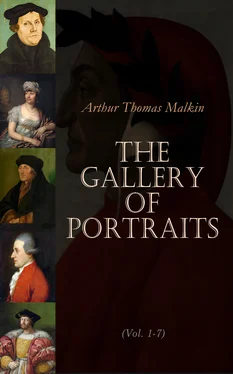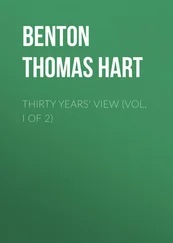This victory left Handel master of the field for some years, and the academy prospered. During this period he brought out about fifteen of his best operas. But the genius of discord must always have a seat in the temple of harmony, and a dispute between the German manager and the Italian soprano, Senesino, renewed former quarrels, broke up the academy, materially damaged the fortune of the great composer, and was the cause of infinite vexation to him during much of his future life.
Dr. Arbuthnot, always a staunch friend of Handel, now became his champion, and his ridicule had more weight with the sensible portion of the public than the futile arguments, if they deserve the name, advanced by the noble supporters of Senesino. But fashion and prejudice were, as usual, too strong for reason: a rival opera-house was opened in Lincoln’s Inn Fields, and after having composed several new operas, comprising some of his best, and having sacrificed nearly the whole of his property and injured his health, in a spirited attempt to support the cause of the lyric stage against the presumption of singers, and the folly of their abettors, Handel was at last compelled to terminate his ineffectual labours, and stop his ruinous expenses, by abandoning the contest and the Italian opera together.
The sacred musical drama, or oratorio, was ultimately destined to repair his all but ruined fortune, and to establish his fame beyond the reach of cavil, and for ever. Esther, the words of which it is said were the joint production of Pope and Arbuthnot, was composed for the Duke of Chandos in 1720. In 1732 it was performed ten nights at the Haymarket, or King’s Theatre. Deborah was produced in 1733, and in the same year Athalia was brought out at Oxford. These three oratorios were performed at Covent Garden, in the Lent of 1734. Acis and Galatea, and Alexander’s Feast, were brought out in 1735; Israel in Egypt, in 1738; L’Allegro ed il Penseroso, in 1739. Saul was produced at the theatre in Lincoln’s Inn Fields in 1740. But up to this period his oratorios failed to reimburse him for the expenses incurred; and even the Messiah, that sublime and matchless work, was, as Dr. Burney, Sir John Hawkins, and Handel’s first biographer, Mr. Mainwaring, all agree in stating, not only ill attended, but ill received, when first given to the public, in the capital of the empire, in 1741.
Such miscarriages, and a severe fit of illness, the supposed consequence of them, determined him to try his oratorios in the sister kingdom, where he hoped to be out of the reach of prejudice, envy, and hostility. Dublin was at that time noted for the gaiety and splendour of its court, and the opulence and spirit of its principal inhabitants. Handel, therefore, judged wisely in appealing to such a people. Pope in his Dunciad alludes to this part of his history, introducing a poor phantom as representative of the Italian opera, who thus instructs Dullness:—
But soon, ah soon, rebellion will commence,
If Music meanly borrows aid from sense:
Strong in new arms, lo! giant Handel stands,
Like bold Briareus, with a hundred hands:
To stir, to rouse, to shake the soul he comes,
And Jove’s own thunders follow Mars’s drums.
Arrest him, empress, or you sleep no more.—
She heard—and drove him to th’ Hibernian shore.
“On his arrival in Dublin,” we are told by Dr. Burney, in his Commemoration of Handel, “he, with equal judgment and humanity, began by performing the Messiah for the benefit of the city prison. This act of generosity and benevolence met with universal approbation, as well as his music, which was admirably performed.” He remained in Ireland about nine months, where his finances began to mend, an earnest, as it were, of the more favourable reception which he experienced on returning to London in 1742. He then recommenced his oratorios at Covent Garden; Sampson was the first performed. And now fortune seemed to wait on all his undertakings; and he took the tide at the flood. His last oratorio became most popular, and the Messiah was now received with universal admiration and applause. Dr. Burney remarks, “From that time to the present, this great work has been heard in all parts of the kingdom with increasing reverence and delight; it has fed the hungry, clothed the naked, fostered the orphan,” and, he might have added, healed the sick. Influenced by the most disinterested motives of humanity, Handel resolved to perform his Messiah annually for the benefit of the Foundling Hospital, and, under his own direction and that of his successors, it added to the funds of that charity alone the sum of £10,300. How much it has produced to other benevolent institutions, it is impossible to calculate; the amount must be enormous.
He continued his oratorios till almost the moment of his death, and derived considerable pecuniary advantage from them, though a considerable portion of the nobility persevered in their opposition to him. George II., however, was his steady patron, and constantly attended his performances, when they were abandoned by most of his court.
In the close of life, Handel had the misfortune to lose his sight, from an attack of gutta serena, in 1751. This evil for a time plunged him into deep despondency; but when the event was no longer doubtful, an earnest and sincere sense of religion enabled him to bear his affliction with fortitude, and he not only continued to perform, but even to compose. For this purpose, he employed as his amanuensis Mr. John Christian Smith, a good musician, who furnished materials for a life of his employer and friend, and succeeded him in the management of the oratorios. “To see him, however,” Dr. Burney feelingly observes, “led to the organ after this calamity, at upwards of seventy years of age, and then conducted towards the audience to make his accustomed obeisance, was a sight so truly afflicting to persons of sensibility, as greatly diminished their pleasure in hearing him perform.”
His last appearance in public was on the 6th of April, 1759. He died that day week, on Good-Friday, thus realizing a hope which he expressed a very few days before his decease, when aware that his last hours were approaching. He was buried in Westminster Abbey; the Dean, Dr. Pearce, Bishop of Rochester, assisted by all the officers of the choir, performed the ceremony. A fine monument, executed by Roubiliac, is placed in Poet’s Corner, above the spot where his mortal remains are deposited; but a still more honourable tribute to his memory was paid in the year 1784, by the performances which took place under the roof which covers his dust. A century having then elapsed from the time of his birth, it was proposed that a Commemoration of Handel should take place. The management of it was intrusted to the directors of the ancient concert, and eight of the most distinguished members of the musical profession. The King, George III., zealously patronised the undertaking, and nearly all the upper classes of the kingdom seconded the royal views. A vocal and instrumental band of 525 persons was collected from all parts, for the purpose of performing in a manner never before even imagined, the choicest works of the master. The great aisle in Westminster Abbey was fitted up for the occasion, with boxes for the Royal Family, the Directors, the Bench of Bishops, and the Dean and Prebendaries of the Church; galleries were erected on each side, and a grand orchestra was built over the great west door, extending from within a few feet of the ground, to nearly half-way up the great window. There were four morning performances in the church: the tickets of admission were one guinea each; and the gross receipts (including an evening concert at the Pantheon) amounted to £12,736. The disbursements rather exceeded £6,000, and the profits were given to the Society for Decayed Musicians and the Westminster Hospital; £6,000 to the former, and £1,000 to the latter. Such was the success of this great enterprise, that similar performances, increasing each year in magnitude, took place annually till the period of the French Revolution, when the state of public affairs did not encourage their longer continuance.
Читать дальше












